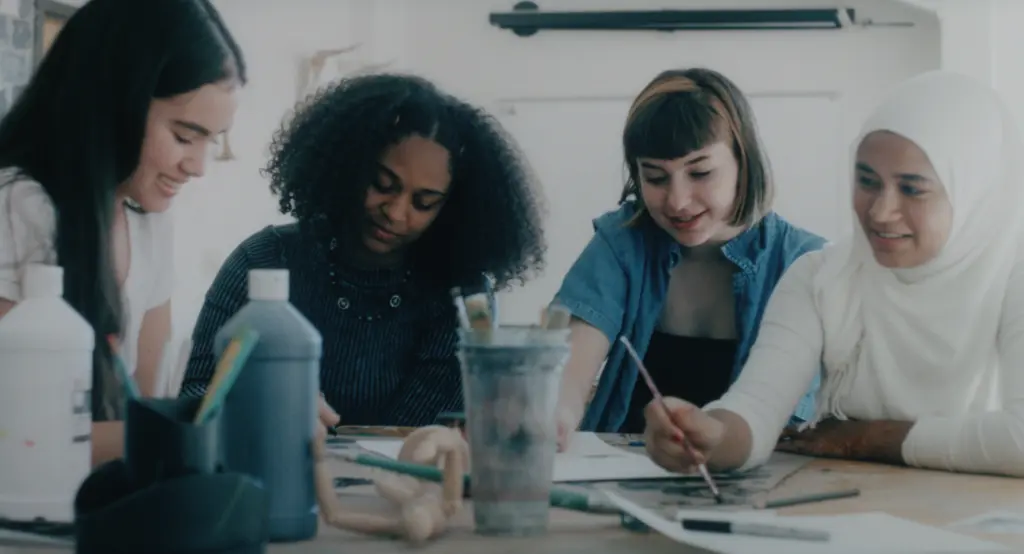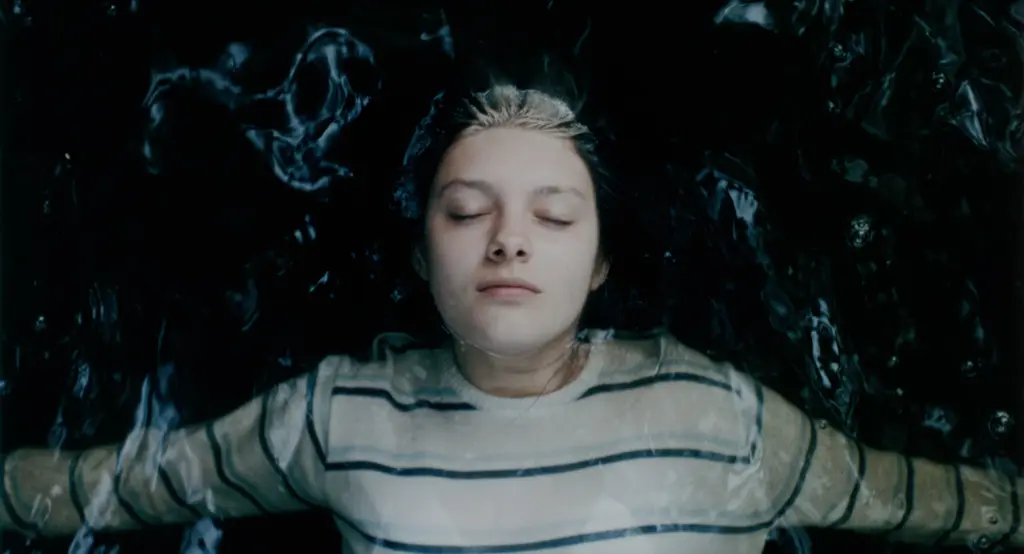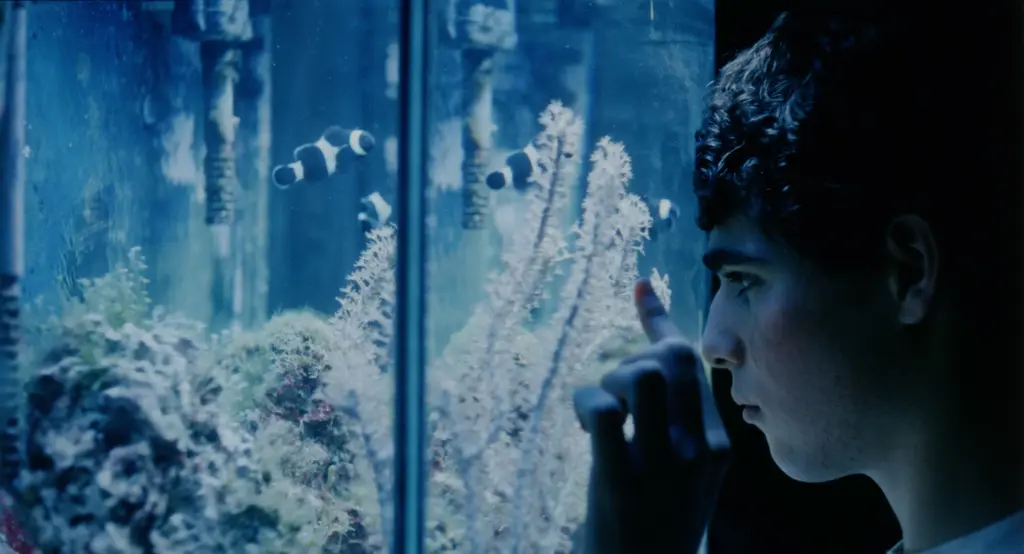Salamander Days: a coming-of-age film like no other

There have been sold-out screenings across Europe and the States and there's a full-blown trilogy in the works. The film’s directors Rebekah Sherman-Myntti and KJ Rothweiler tell us how they pursued their dreams on a shoestring budget.
Culture
Words: Jade Wickes
Memory is a funny thing. It twists and fractures depending on the subject. You might remember things out of time, or pin significance to otherwise mundane moments. Memory, basically, defines who you are.
This is a feeling understood by New York-based directing duo Rebekah Sherman-Myntti and KJ Rothweiler, whose film Salamander Days follows the lives of friends as they navigate the aftermath of a mysterious, devastating event which the audience aren’t privy to.
Set in a high school, and starring Alex Arauz and Pretty Sick’s Sabrina Fuentes, it’s light on dialogue and heavy on atmosphere, punctuated by scenes of an unusual hospice class, where students are taught about mortality and destigmatising conversations around death and loss. Some of its sharpest, wisest lines are delivered by the teachers – as one points out, they spend just as much time with these kids as their parents, yet know them in an entirely different way.
Referencing the visual styles of Gus Van Sant and Olivier Assayas, and featuring a brilliant score by Curtis Everett Pawley, the film has rightfully received critical acclaim over the last few months, too. Since then, Rebekah and KJ have been on a roadshow of sorts, taking the film to Los Angeles, Paris, Berlin, London, and of course, New York, selling out every screening in the process. Not bad for a debut feature that was made on a shoestring budget six years ago in Rochester, upstate New York, where Rebekah was raised.
Since then, she and KJ have been busy filling up their CVs, from picking up legal videography gigs (that is, recording legal proceedings) to make ends meet to working on their individual projects. Rebekah’s ongoing solo film series Tomorrow documents artists across different disciplines; meanwhile, KJ co-hosts the hit podcast The Ion Pack alongside Everett Pawley. Initially born as an Instagram meme page in 2018, The Ion Pack’s MO is to skewer NYC’s downtown film scene – with love, of course – which has impressed enough people to warrant a New York Times profile. Oh, and Salamander Days is the first instalment of a trilogy, with the next two films to be directed as solo efforts by Rebekah and KJ, respectively.
But for now, the pair are laser-focused on getting the first instalment Salamander Days in front of as many eyeballs as possible. Here’s what they had to say about it all…
Hi KJ and Rebekah! How did your friendship develop into a professional collaboration?
R: We met on our very first day [at New York arts university] Sarah Lawrence, when we were 18. We were signing up to film classes, from film history to experimental film – I think you can see traces of that in Salamander Days. From the beginning, there was very much an agreement between us that we wanted to make movies and that was something we wanted to do together. Now the collaboration has existed for, what, 14 years?
KJ: 15.
R: We’ve basically been trying to figure out how to do what we loved as teenagers, as adults.
Why has it always felt right to do that as a duo?
KJ: We’ve always wanted to make things together, but we’ve also both always wanted to make a coming-of-age high school movie that we hadn’t seen before. Making a movie is insanely hard – there’s no real roadmap of how to make it work.
R: Especially when you don’t have the resources of a big production.
KJ: We were trying to figure that out while leaning on each other.
R: It was our film school in a lot of ways.
You’ve mentioned that Salamander Days is the first instalment in a trilogy and you’ll be directing the other two films individually. Can you tell us more about that?
KJ: We’re going to be competitors! Well, Salamander Days is about finding your voice. There’s that scene in the art class where the teacher asks Sabrina and Max, “What are you trying to express?” This movie is about me and Rebekah trying to figure out what our voice is. It’ll be exciting to whip up that newfound confidence and make our own things with fresh wisdom.
R: We have this great mentor from school, this old French guy. He watched the movie with us in Paris, and KJ and I hold his opinion in very high regard. He’s also brutal, so if he doesn’t like something, he’ll tell us.
KJ: (French accent) “This is shit!”
R: He told us that the goal of a first film is to communicate to an audience your sensibility and sensitivity. He saw that in Salamander Days, so mission accomplished.
“I don’t like movies about people in their thirties. Adolescence, even if you don’t go through something that’s black and white traumatic, it’s still a traumatic thing, like giving birth to yourself or something”
KJ Rothweiler
How did it feel to watch a movie you shot six years ago? That’s a long time!
KJ: Back then, I was such a different, more sensitive and more emotionally in-touch person, I think. I don’t know if I’d have the emotional access to make a movie like that now. I’m kind of jealous of how naive it is.
R: But the themes in Salamander Days are ones that I’ve always wanted to explore: mortality and death, coping with loss. I think those are weighty issues that will always be present in my work.
Can you tell me more about the inception of the film?
KJ: While we were living in New York in our late twenties, we were realising that if we don’t make a movie soon, maybe we never will. So we left the city and moved into a cabin my parents own in the woods of Pennsylvania. We wanted to make a cheaper movie that we could control.
R: I went to a school in upstate New York where my mom taught – I have a very good relationship with them. They were happy for us to shoot it there. It was all about making the most of people who were willing to help. The film was so collaborative in that way.
Why does the coming-of-age theme appeal to you so much?
KJ: It’s the only time period of my life that still feels interesting or compelling to me. I don’t like movies about people in their thirties. Adolescence, even if you don’t go through something that’s black and white traumatic, it’s still a traumatic thing, like giving birth to yourself or something.
And I feel like a lot of movies about that experience, even the ones we really liked, didn’t really capture that element of it. Or they shy away from that because the process of becoming an adult is, like, actively forgetting how difficult that time period was.
R: And so much of that time is about existing in your own mind. It’s a completely different way of processing things to the way we do now. And for a lot of people, it’s when you experience loss for the first time, when you’re really engaging with questions about what death is and what you wanna do with your life.



In terms of casting, why did Alex and Sabrina feel like a good fit for your lead characters?
R: It’s funny to look back on now, because they were still in high school at the time. We were aware of them just from being in New York, and through Sabrina we discovered Alex. At the time, there were so many photos of them circulating and they were so striking. We really wanted to cast people who were actually friends in real life. Sabrina and Alex had such a strong, palpable friendship.
KJ: I also think their generation is so comfortable in front of a camera. They’re not as self-conscious as millennials.
What about the name of the film, Salamander Days – what was important to you about salamander imagery as a symbol of regeneration?
R: When we were in college, I think we were probably 20, we heard those words together. I remember we turned to each other and we were like, that’s the title of our movie. We hadn’t even written anything yet.
KJ: We kind of knew it was gibberish when we heard it – like the porn name Dirk Diggler or something. Salamander Days just had something that we both really resonated with.
R: So when we realised that the salamander had this historical rooting in transformation and evolution, emerging out of fire…
KJ: It ended up being a perfect vehicle for what we wanted to say.
What do you hope the audience will get out of watching the film?
KJ: I like films and music that are elusive to me, and some people have said that the film makes them feel something they can’t necessarily put into words, which I like. I love that about cinema – that it transcends language. Because a big part of the edit was about removing that.
R: I also hope it challenges you as a viewer to reject impressions of what a conventional coming-of-age film is. Then you can exist in our world and be along for the ride.




